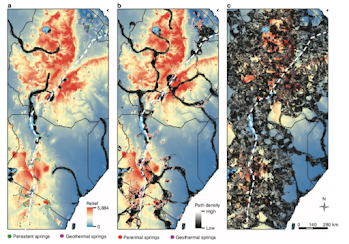Hunger Knows No Friend But It's Colonial Powers
Colonialism is inalienable from the story of famine in African nations in the past and still very much today. The problem of water in postcolonial societies stems from the colonial rule of European powers of African nations (Fontein, 2008). Thus, it is the case that ongoing water conflicts cannot be fully understood without considering the legacy of colonialism on African nations (Mathur and Mulwafu, 2018). This post will discuss the intricacy of water in Africa stemming from the colonial era and the implications colonialism has had on food security. Malawi will be used as an example since Malawi – along with Mozambique, Zambia and Zimbabwe – has experienced the worst drought in 35 years risking nine million lives. Although money is the roots of all evil – money being colonial power in this case – unpredictable climate conditions hold significant importance in understanding food scarcity in Malawi but also African nations in general.
Colonialism: Effect On Water & Food
Political ecologists increasingly argue for the recognition of colonial power relations in determining how water resources are distributed as opposed to geology and climatology (Loftus, 2009). Colonialism is the practice of establishing rule over an indigenous majority with the race beginning in Africa in 1880 and it wasn’t till 1914 when decolonization began. The video below explains how European colonial powers divided up the continent of Africa.
Figure 1: How Europeans Divided Africa 1914
Source: Youtube
British rule in Africa encouraged the production of commercial crops including maize, wheat, groundnuts, rice, vegetables and fruit (Nhamo, Mabhaudhi, and Magombeyi, 2016). The establishment of British rule in the nineteenth century led to Malawi’s reliance on the agrarian economy and susceptible to economic fallout.
Looking back in history, the problem of over reliance on the agrarian economy was recognised even before climate change was heard of. Ecological damage including soil erosion and land degradation in the 1920s as a result of over cultivation to produce commercial crops occurred. Additionally, the drying up of Lake Chilwa in the 1930s led to the collapse of fisheries reducing employment in Malawi (Mathur and Mulwafu, 2018).
Post-Colonialism legacy On Water & Food
Agriculture as a result of colonisation therefore, undoubtedly was and still is salient to the Malawian economy. In the face of independence of African nations by European powers, we must still ask ‘just how decolonized are decolonized African nations?’ Despite African nations having been given back power they are entitled to, water-user groups and privately-operated irrigation projects have operated in Africa since the 1950s (ODI, 2019). Thus, power over agricultural production continues to remain in the hands of the rich.
Furthermore, agricultural production constitutes more than one third of GDP, more than 90% of export earnings and keeps 81% of the population in employment (Chirwa et al., 2008). Since Malawi is an agro-based economy, agriculture consumes the largest amount of water, 79% of total water to be precise (Nhamo, Mabhaudhi, and Magombeyi, 2016). This is problematic given the challenges African nations face today concerning the climate.
One can only begin to imagine the impact of climate change on Malawi and other African nations in the current era. With increasing risk of drought resulting from climate change, Malawi is not able to produce the maize requirement needed to feed its population nor for export abroad despite the crop contributing to over 70% of dietary calories (Ellis and Manda, 2012). 1.8 million tonnes of maize are required however, in 2004-2004, only 1.2 million tonnes were harvested (ibid).
Figure 2: Maize crop
Source: Picfair
Malawi’s dependence on agricultural production, in particular maize, as a result of colonialism and post-colonist legacy means the country is under increasing threat with more than 2.8 million at risk of extreme hunger as rainfall becomes more unpredictable (United Nations, nd). This would result in the worst food crisis in a decade with 4 in 10 children susceptible to stunting warned by the United Nations World Food Programme (World Food Programme, 2021).
Therefore, undoubtedly, the problem of over reliance on the agrarian economy by African nations is apparent during the years of the colonial empire and during the post-colonial period. Furthermore, in the years to come climate change is thought to increase the unpredictability of rainfall and the occurrence of drought thus, exacerbating the production shortfalls seen throughout history (Nhamo, Mabhaudhi, and Magombeyi, 2016). This will to negative effects on African economies in terms of a reduction in employment and contributions to GDP but more importantly, hunger as a result of the colonial period leading to dependence of the agrarian economy by African nations.



There's a good engagement with literature in this post but the conversation keeps moving between the case study of Malawi and the African continent. I would like to learn more about is colonial and postcolonial water and agriculture poliicies in Malawi. In the introduction post, i suggested how to go about the embeding of referencing, which should be applied in this post too. Even though you stated that the post will be about Malawi, you didn't give much information about the physiogeography of Malawi nor details of the agricultural production in relation to export.
ReplyDeleteThank you Clement - I am currently going through and embedding the links in places where I feel a link can be embedded rather than a reference. I will also look for more and include more discussion of Malawi.
DeleteI really enjoyed reading this post! It is interesting to see how colonialism bred this over-reliance on agriculture. How do you see Malawi's economic structure changing in the future? Do you think they will be able to get more out of this sector and perhaps diversifying into other areas?
ReplyDelete